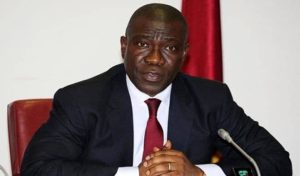
A former Deputy Senate President, Senator Ike Ekweremadu has praised the governments of Rivers and Lagos States over what he described as their courageous actions as touching the issue of Value Added Tax (VAT) collection.
The lawmaker in a statement on Sunday said the federal government has been shying away from implementing true federalism but rather bent on implementing a version forced on the country by past military regimes.
He made the submission while weighing in on the current face-off between the two state governments and the Federal Inland Revenue Service (FIRS) on the collection of VAT.
Naija News recalls both the Rivers and Lagos State governments have publicly declared their intentions to start collecting VATs generated directly in their states with the Governors signing appropriate bills into law to back up their actions.
The FIRS has kicked against the development and taken the matter to court.
However, the court of appeal has ordered all parties involved to maintain status quo pending the determination of an appeal that was lodged before it by the Federal Inland Revenue Service, FIRS.
Making his stand known on the saga, Ekweremadu urged the National Assembly not to interfere by obliging a request from the FIRS which wants the lawmakers to amend Nigeria’s constitution and move VAT collection to the Exclusive Legislative List which will, in turn, give the federal government exclusive right on VAT collection in the country.
He accused the FIRS of attempting to go through the back door to achieve its aim.
Ekweremadu in a statement by his media adviser, Mr. Uche Anichukwu, on Sunday said: “I commend Governors Nyesom Wike and Babajide Sanwo-Olu as well as the Rivers and Lagos Houses of Assembly for their courageous moves. It is by so doing that our constitution or laws can be tested and our federalism strengthened.”
He recalled that as far back as 2012, he had warned that except Nigeria reviews its federal structure, the country was sure to run into some agitations touching on resource control and other challenges.
Ekweremadu observed that the 7th National Assembly had attempted to make some changes which were rejected by the President who refused to sign their bill recommending the changes into law.
“In April 2012, I delivered a lecture at the Osgoode Hall Law School, York University, Canada, entitled ‘Nigerian Federalism: A Case for a Review’ wherein I forewarned that Nigeria would surely run into stormy economic weather unless we reinvented our federalism, steering the country away from a military-imposed ‘feeding bottle federalism’ to one predicated on self-reliance, hard work, enterprise, and resourcefulness to catalyse national development and economic prosperity. Many others have also made related calls. Unfortunately, few people were interested in what we were talking about.
“Although we achieved a number of successes, perhaps my worst experience at the helms of the constitution amendment process was in the Seventh Assembly. We recorded the most elaborate amendments to our constitution, including the rearrangement of the Legislative Lists to devolve more powers to the subnational governments by moving certain items like Aviation, Railway, Power, Stamp Duties, among others to the Concurrent Legislative List. Unfortunately, the amendments were denied assent by the President.
“But as a lawyer and lawmaker, I know that case law or judicial precedent, is also a veritable source of law. So, I think we should allow the Constitution and the laws of our land to be tested in the courts of law.
“It is untidy for the Presidency or its agency to come through the backdoor to seek legislative intervention in its favour on the same matter that is prejudice.
“The ball is now in the court of the judiciary and all we should seek at this juncture is an expedited and courageous adjudication of the lawsuits”.
Ekweremadu added that government at all levels must look at ways of diversifying their income away from petroleum resources and prevent a situation where some states work to get the VAT and others who didn’t put corresponding efforts get to share the money because of the current federal structure Nigeria is running.
“The bottom line of the raging tax ‘war’ is that having unwittingly killed industry, having elevated our nation to an oil dependent economy, and consequent upon the collapse of oil price amid other sources of energy, our economy is virtually collapsing, the naira has crashed to an all-time low, and the nation has come to rely more and more on taxes. Inevitably, some states have now begun to question some practices they feel fly in the face of federalism and justice, among them the collection and distribution of VAT and other taxes.
“VAT is essentially a consumption tax and what states like Rivers and Lagos are saying in essence is that the federal government cannot continue to rob them of taxes paid on goods and services consumed in their states, some with environmental and social consequences that they have to deal with, but only to withhold as well as transfer a large chunk of such revenues to other states.
“The major takeaway from our ailing economy, collapse of the naira, and the VAT and stamp duty imbroglio is that our feeding bottle strand of federalism is no longer sustainable. We must diversify and expand our economy now; and there is no other way than to remake our federalism to enable states to harness and unleash their endowments and comparative advantages.
“Rather than begrudge states like Rivers and Lagos, all federating units should be encouraged and enabled to look inwards to reinvent themselves, boosting their respective competitiveness through improved security, human capital development, industry, and building of egalitarian and cosmopolitan societies to attract more investments and economically viable populations. That is how federations are meant to function”, he concluded.
This article was originally published on Naija News


